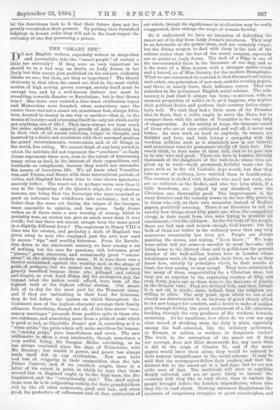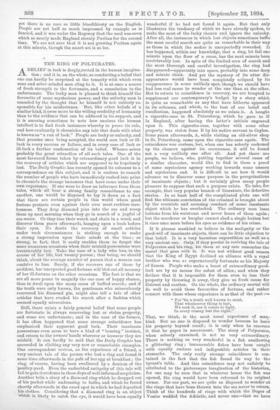THE " SMART SET."
DO not English writers, especially writers in magazines and journalists, take the "smart people" of society a little too seriously ? If they were so -very important we should be in a bad way, no doubt, as Lady Jenne, in her lively but thin essays just published on the subject, evidently thinks we are ; but then, are they so important P The theory obviously is, that when the smart set, that is, the most visible section of high society, grows corrupt, society itself must be corrupt too, and by a well-known historic law must be stumbling towards disaster or Revolution ; but is that theory true ? Has there ever existed a time since civilisation began and Monarchies were founded, when somewhere near the centre there was not a smart set, sometimes fast, always frivo- lous, devoted to money in one way or another—that is, to the means of luxury—and esteeming itself the only set which really got anything out of life P They have always too been much the same, splendid in apparel, greedy of gain, viciously lax in their view of all sexual relations, vulgar in thought, and haunted by a desire not consistent with their assumed position for grand entertainments, ceremonials, and, of all things in the world, fine eating. We cannot think of any long period in which the satirists did not represent the "courtiers" as Lady Jenne represents them now, even to the extent of denouncing many wives as frail, in the interest of their expenditure, and husbands as complacent, because they would not surrender the means of luxurious life. We all know what Versailles was, and Vienna and Rome, with their intermittent periods of virtue, and England has from time to time shown spectacles scarcely better. The smart set is perhaps worse now than it was in the beginning of the Queen's reign, for very obvious reasons, one being that the Sovereign who once exercised so good an influence has withdrawn into seclusion ; but it is better than the same set during the reigns of the Georges, more amenable to opinion, and less gross. Lady Jenne writes as if there were a new worship of money, which is probably true, as money can give so much more than it ever could ; but has there not almost always been the same greed in a slightly different form P The eagerness in Henry VIII.'s time was for estates, and probably a sixth of England was given away to men who employed just the arts now used to secure " tips " and wealthy heiresses. From the Revolu- tion down to the nineteenth century, we hear among a set of nothing but the race for pensions, rich heiresses, great "places," great sinecures, and occasionally great " conces- sions " in the strictly modern sense. It is true there was a barrier maintained against the wealthy mob in the shape of pride of pedigree, but we cannot see that the virtues were greatly benefited because those who pillaged and robbed and fought, as even Lord Eldon did, for prodigious pay, far beyond what the nation could afford, were men of the highest rank or the highest official station. Oar smart folk of to-day for the most part let the Treasury alone, and if they are unblushing in their hunt for heiresses, they do but follow the system on which throughout the Continent men of the highest character arrange their family alliances. Something, though not all, of this fuss about "mer- cenary marriages " proceeds from positive spite in those who are outshone, and something more from a pride of caste which is good or bad, as Charlotte Bronto put it, according as it is "clean pride," the pride which will make sacrifices for honour, or " mucky pride," pure boastfulness and scorn. The new millionaire is often a very intolerable, though sometimes a very useful, being, Sir Gorgias Midas coexisting, as he has always coexisted since the days of Trimalchio, with Mr. Brassey ; but wealth is power, and power has always made itself felt in any civilisation. Few men have had loss of vulgarity in their composition than the late Prince Consort, and, if we recollect aright, there is a letter of his extant in print, in which he says that those around him in England ought to be the high-born, the dis- tinguished, and the "exceptionally rich." The chief injury these men do is in vulgarising society, for their grandchildren will be like all other aristocrats, good and bad; and when good, the protectors of refinement and of that cultivation of art which, though its significance in civilisation may be easily exaggerated, does enlarge the scope of human faculty.
Be it understood we have no intention of defending the smart set of to-day from Lady Jeune's strictures. They may be as detestable as she paints them, and are certainly vulgar, but the fitting weapon to deal with them is the lash of the satirist rather than the fear of the moral essayist, especially one so genial as Lady Jeune. The lack of a Pope is one of the unaccountable facts in the literature of our day, and so is the want of a Miss Austen with a stronger satiric touch and a. hatred, as of Miss Burney, for the modern Branghtons. What we are concerned to contend is that the smart set injure each other, one generation of new men, and the evening papers, and there, or nearly there, their influence ceases. They are nobodies in the permanent English social scheme. The aris- tocracy is just what it always has been,—a mixture, with an unusual proportion of nobles in it, as it happens, who neglect their political duties and perform their country duties singu- larly well. We wish they had a little more of the Prussian idea in them, that a noble ought to serve the State, but to compare them with the nobles of Versailles is the very folly of exaggeration. As for society at large, the immense crowd of those who are at once cultivated and well off, it never was better. Its men work as hard as anybody, its women are faithful and true, and both betray a sympathy with the working millions such as is absolutely new in our history, and sometimes runs its possessors wholly off their feet. One would think, to hear some of them talk, that to be poor was to be also wise and good. There are here in London literally thousands of the daughters of the well-to-do whose lives are given up to work—hard, persistent, faithful work—for the poor, such as in the old Catholic days would, but that they take no vow of celibacy, have entitled them to beatification. The country is choked with families who need not work, who are as cultured as the Medici, and who live lives which, if a little humdrum, are, judged by any standard, even the Christian one, thoroughly good. The improvement in the rural districts and the country towns in the last fifty years is, to those who rely on their own memories instead of Radical papers, positively amazing. There is no literature to tell us exactly how things stood fifty years ago, when the evangelical clergy, in their recoil from vice, were trying to prohibit all amusement,---but the old know. As for the body of the people, there are bad men and women enough, God knows ! but the bulk of them are better in the ordinary sense than any very numerous community has been yet. People are always painting the slums, and saying, "Look there ! " We hope some artist will yet arise—a novelist he must be—who will bring home to the literary class and to politicians the general interior of the half-million houses here in London whose inhabitants work all day, and guide their lives, as far as they know how, strictly by principles which, in their results at least, the best among us may accept. They have substituted, too many of them, respectability for a Christian ideal, but they are as superior to the roystering rowdies of fifty, and even forty, years ago as those were to the denizens of Alsatia in the Stuarts' time. They are civilised folk, and that, though it is not all, is much ; more, indeed, than the religious are willing to allow. The only point upon which we can at all clearly see deterioration is an increase of greed closely allied to the new hunger for comfort, and a desire to make of sudden gain through betting the great excitement of a life otherwise tending, through the very goodness of the workers, towards monotony. As for manliness, how often do we ever see any clear record of skulking when the duty is plain, especially among the half-educated, like the ordinary policemen, or firemen, or sailors, or workers in dangerous trades ? The truth is, the corruption of the smart set, if they are corrupt, does not filter downwards far, any more than it did in the reign of Charles IL, and if the news- papers would leave them alone, they would be reduced to their natural insignificance in the social scheme. It may be said that the newspapers follow their readers, and that the interest felt in the smart set is a bad sign ; but we are not quite sure of that, The multitude will stare at anything deeply coloured, and are no more likely to imitate the eccentric folk they like to read about, than to imitate the people brought before the London stipendiaries, whom also they like to read about. Nothing entrances Englishmen like accounts of sanguinary struggles or great catastrophes, and yet there is no race so little bloodthirsty as the English. People are not half so much impressed by example as is fancied, and it was under the Regency that the seed was sown which so nearly made England sternly Puritan for the second time. We are not sure that it is not growing Puritan again at this minute, though the smart set is so lax.



































 Previous page
Previous page